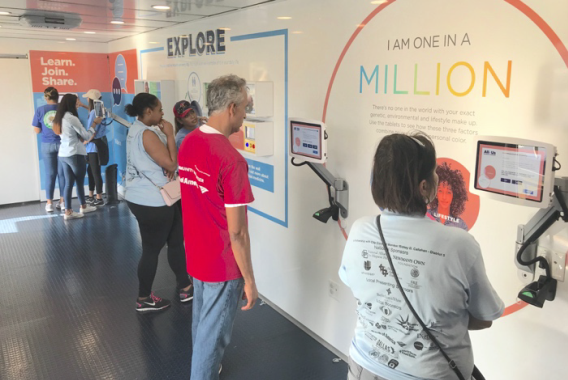 This week, LSU Health New Orleans will host the National Institutes of Health’s All of Us Journey, a traveling, hands-on exhibit that raises awareness about the All of Us Research Program. All of Us aims to speed up health research and medical breakthroughs. To do so, All of Us is asking 1 million volunteers to share different types of health and lifestyle information—information like where they live, what they do, and their family health history.
This week, LSU Health New Orleans will host the National Institutes of Health’s All of Us Journey, a traveling, hands-on exhibit that raises awareness about the All of Us Research Program. All of Us aims to speed up health research and medical breakthroughs. To do so, All of Us is asking 1 million volunteers to share different types of health and lifestyle information—information like where they live, what they do, and their family health history.
New Orleans is one stop on the All of Us Journey’s national tour. On Oct. 11, LSU Health New Orleans invites the public to attend this event to learn more about the research program and how it could advance individualized prevention, treatment, and healthcare.
The exhibit will be located in the parking lot in front of the former interim LSU Hospital, 2000 block of Perdido St. (Between Perdido and Poydras Streets and South Prieur and South Johnson Streets) from 8:30 a.m.-2:30 p.m.
Unlike a single research study focused on a specific disease or community, the All of Us Research Program will create a research resource to inform thousands of studies, covering a wide range of health conditions. This information could help researchers learn more about different diseases and treatments and improve health for generations to come.
NIH and its partners, including LSU Health New Orleans, are creating a research community of one million people who will share their unique health data. This will include answering survey questions and sharing electronic health records (EHR). Some participants may also be asked to provide blood or urine samples. They will be asked to answer more questions from time to time. It’s up to participants to decide how much information they want to share.
The health data gathered from participants will be stored in a database. Approved researchers can access this data to explore how factors like environment, lifestyle, and genes, can impact health. This may help develop new medical treatments that are unique to individuals.
The All of Us Research Program is part of the Precision Medicine Initiative. Precision medicine is healthcare that is based on individuals. It takes into account factors like where a person lives, occupation, and family health history. Precision medicine’s goal is to be able to tell people the best ways to stay healthy. If someone does get sick, precision medicine may help healthcare teams find the treatment that will work best. This will help give healthcare providers the information they need to make tailored recommendations, relevant to people of different backgrounds, ages, or regions.
